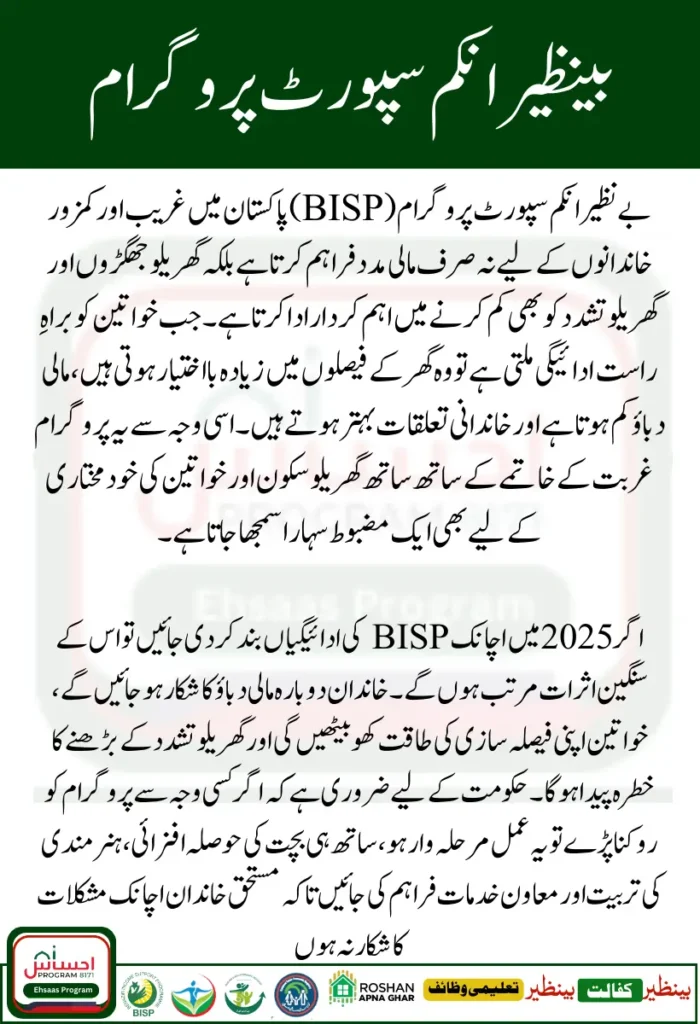Discover how BISP Cash Transfers & IPV 2025 reduce poverty and intimate partner violence (IPV) in Pakistan. Learn about the risks of sudden discontinuation, global evidence, and policy recommendations for sustainable social protection.

BISP Cash Transfers & IPV 2025
Cash transfer programs are widely recognized across the globe as effective strategies to reduce poverty, improve household well-being, and empower women. In Pakistan, the Benazir Income Support Programme (BISP) has emerged as one of South Asia’s largest and most impactful social protection initiatives. Beyond financial relief, BISP has also shown positive effects in reducing intimate partner violence (IPV) by easing financial stress and strengthening women’s autonomy within households.
However, with discussions around potential disruptions in 2025, many families worry about the risks that could arise if payments are suddenly stopped. This article explores the role of BISP in poverty reduction, its impact on IPV, and the dangers of sudden discontinuation.
You Can Also Read : BISP 8171 CNIC Verification & Payment Tracking 2025
Beyond Financial Aid: How BISP Transforms Lives
The BISP program is more than just financial assistance—it reshapes family dynamics and improves social well-being. Studies show that direct cash transfers significantly reduce IPV risks by:
- Easing financial burdens and reducing household conflicts.
- Strengthening women’s role in decision-making.
- Promoting healthier family communication and relationships.
- Enhancing women’s social recognition within the community.
This is why BISP has been considered not only a poverty-alleviation tool but also a shield against domestic violence in Pakistan.
You Can Also Read : BISP 8171 Verification Process September 2025
Why BISP Matters in 2025
Cash transfers are not merely about money; they are about creating balance and harmony within households. By making women the direct recipients of funds, BISP places them at the center of empowerment.
Key Benefits of BISP Transfers:
- Reduced Financial Stress: Families worry less about food, healthcare, and education.
- Empowered Women: Direct payments strengthen women’s decision-making power.
- Improved Family Relations: Less stress leads to fewer disputes and healthier communication.
- Social Recognition: Women gain respect by contributing financially to their households.
BISP Role in Pakistan’s Social Protection Network
Launched in 2008, BISP quickly became the backbone of Pakistan’s social safety system. Its core strengths include:
- Payments targeted directly to women.
- Unconditional funds, allowing families to prioritize their most urgent needs.
- Wide national coverage, reaching millions of vulnerable households.
Beyond poverty reduction, BISP promotes:
- Education: Financial aid helps keep children in school.
- Healthcare: Families invest in nutrition and medical care.
- Household Peace: With financial security, family disputes decline.
You Can Also Read : 8171 Check Online CNIC 2025 – Complete Guide
Risks of Sudden Discontinuation in 2025
If BISP transfers are suddenly stopped, the consequences could be devastating for families across Pakistan.
Key Risks Include:
- Return of Financial Stress: Food insecurity, unpaid bills, and increased debt.
- Loss of Women’s Autonomy: Financial power shifts back to men, weakening women’s influence.
- Household Conflicts: Rising stress often fuels IPV and domestic disputes.
- Unequal Outcomes: While some households may survive through savings, the poorest will suffer immediate setbacks.
Why Stopping BISP Payments Fuels IPV
Ending cash transfers can directly worsen IPV rates due to:
- Economic Pressure: Poverty-driven arguments resurface.
- Power Shift: Women lose bargaining power within households.
- Psychological Strain: Stress and frustration increase, raising violence risks.
- Loss of Respect: Women’s reduced contributions lower their social standing.
Global Evidence on Cash Transfers and IPV
International examples prove the effectiveness of cash transfer programs in reducing IPV:
- Bangladesh: Nutrition-linked cash transfers reduced IPV, with long-term benefits.
- Latin America: Education-linked conditional transfers reduced household conflicts.
- Sub-Saharan Africa: Programs targeting women proved more effective than household-based aid.
Lesson: The most effective programs combine cash aid with savings, skills training, and support services.
Strategies to Minimize Harm When Ending Programs
If discontinuation is unavoidable, an abrupt halt must be avoided. Alternative strategies include:
- Phased Exit: Gradually reduce payments instead of cutting them off suddenly.
- Savings Promotion: Encourage households to save during the program.
- Skill Development: Train beneficiaries for income generation.
- Support Services: Offer counseling, literacy programs, and healthcare support.
- Early Notification: Provide families with time to prepare.
Policy Takeaways for Pakistan
To protect vulnerable households and sustain social progress, Pakistan must:
- Keep women as the primary recipients of cash transfers.
- Integrate empowerment and savings mechanisms into programs.
- Develop transition plans before halting or restructuring payments.
- Conduct continuous research to monitor poverty levels and IPV trends.
By applying these strategies, BISP 2025 and beyond can ensure financial security, women’s empowerment, and safer family environments across Pakistan.
You Can Also Read : NADRA Biometric BISP Cash Payments September 2025
FAQs About BISP Cash Transfers & IPV
How does BISP reduce intimate partner violence (IPV)?
BISP reduces IPV by lowering financial stress, empowering women with decision-making power, and improving household communication.
What happens if BISP payments are suddenly discontinued in 2025?
Families may face food insecurity, financial disputes, and increased IPV due to renewed economic stress.
Has BISP improved education and healthcare in Pakistan?
Yes, many families use BISP funds for children’s schooling, nutrition, and healthcare, improving long-term outcomes.
How can Pakistan avoid harm if BISP funding stops?
The government should implement phased exits, promote savings, provide skill development, and offer support services.
Disclaimer
⚠️ Disclaimer: This article is for informational purposes only. We are not affiliated with any government agency. For official updates, visit the official BISP website.
Note: This content is based on publicly available information. We are not affiliated with BISP or any government body. Read full disclaimer here.
